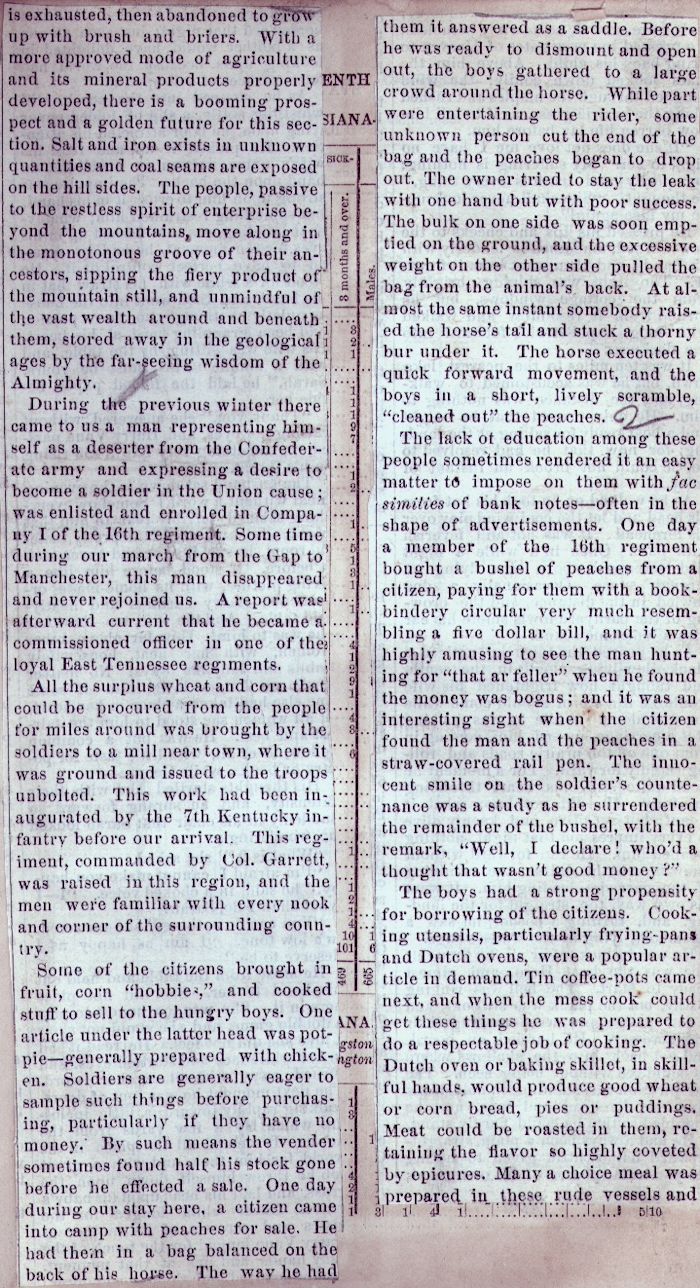| Camp & Field Page 34 | Camp & Field Index Page | 16th OVI Home Page | Camp & Field Page 36 |
The Camp & FieldArticles by Theodore Wolbach |
 Cpl. Theodore D. Wolbach |
The following image is taken from a book titled "Mortality and Statistics of the Census of 1850" in which it is believed retired Captain Rezin H. Vorhes, Company H, pasted over the pages a series of articles written by Cpl. Theodore D. Wolbach, Company E, titled "Camp and Field" and published, by chapter, in the Holmes County (Ohio) Republican newspaper from February 24, 1881 to August 17, 1882. The articles tell the story, in great detail and color, of the 16th OVI, from the inception of the 3-year regiment in October, 1861, through all its camps, battles and marches until it was disbanded on October 31, 1864. The articles pasted in the Vorhes book cover the first 35 chapters, published through October 20, 1881. All the remaining chapters were recently found in a Holmes County library by researcher Rob Garber who obtained copies, performed the transcriptions and provided to this website and which are also presented here, thus providing the complete work by Theodore Wolbach.
Throughout these articles click on the underlined white text for additional details.
The webauthor thanks 16th Ohio descendant Rob Garber for his excellent research on the Camp And Field articles and for performing the tedious digital transcription of those articles found on each page. The transcriptions were made to reflect the original articles verbatim, misspellings and all. Rob is the 3rd great nephew of Capt. William Buchanan, Company F, 16th Ohio, who served in the 90-day regiment as a private, re-enlisting in the three year regiment, and eventually making the rank of Captain of Company F. Thanks Rob!
Page 35 - Chapter 20 - September, 1862
 |
is exhausted, then abandoned to grow up with brush and briers. With a more approved mode of agriculture and its mineral products properly developed, there is a booming prospect and a golden future for this section. Salt and iron exists in unknown quantities and coal seams are exposed on the hill sides. The people, passive to the restless spirit of enterprise beyond the mountains, move along in the monotonous groove of their ancestors, sipping the fiery product of the mountain still, and unmindful of the vast wealth around and beneath them, stored away in the geological ages by the far-seeing wisdom of the Almighty. During the previous winter there came to us a man representing himself as a deserter from the Confederate army and expressing a desire to become a soldier in the Union cause; was enlisted and enrolled in Company I of the 16th regiment. Some time during our march from the Gap to Manchester, this man disappeared and never rejoined us. A report was afterward current that he became a commissioned officer in one of the loyal East Tennessee regiments. All the surplus wheat and corn that could be procured from the people for miles around was brought by the soldiers to a mill near town, where it was ground and issued to the troops unbolted. This work had been inaugurated by the 7th Kentucky infantry before our arrival. This regiment, commanded by Col. Garrett, was raised in this region, and the men were familiar with every nook and corner of the surrounding country. Some of the citizens brought in fruit, corn |
them it answered as a saddle. Before he was ready to dismount and open out, the boys gathered to a large crowd around the horse. While part were entertaining the rider, some unknown person cut the end of the bag and the peaches began to drop out. The owner tried to stay the leak with one hand but with poor success. The bulk on one side was soon emptied on the ground, and the excessive weight on the other side pulled the bag from the animal's back. At almost the same instant somebody raised the horse's tail and stuck a thorny bur under it. The horse executed a quick forward movement, and the boys in a short, lively scramble, The lack of education among these people sometimes rendered it an easy matter to impose on them with facsimilies of bank notes--often in the shape of advertisements. One day a member of the 16th regiment bought a bushel of peaches from a citizen, paying for them with a book-bindery circular very much resembling a five dollar bill, and it was highly amusing to see the man hunting for The boys had a strong propensity for borrowing of the citizens. Cooking utensils, particularly frying-pans and Dutch ovens, were a popular article in demand. Tin coffee-pots came next, and when the mess cook could get these things he was prepared to do a respectable job of cooking. The Dutch oven or baking skillet in skillful hands, would produce good wheat or corn bread, pies or puddings. Meat could be roasted in them, retaining the flavor so highly covered by epicures. Many a choice meal was prepared in these rude vessels and |
| Camp & Field Page 34 | Camp & Field Index Page | 16th OVI Home Page | Camp & Field Page 36 |